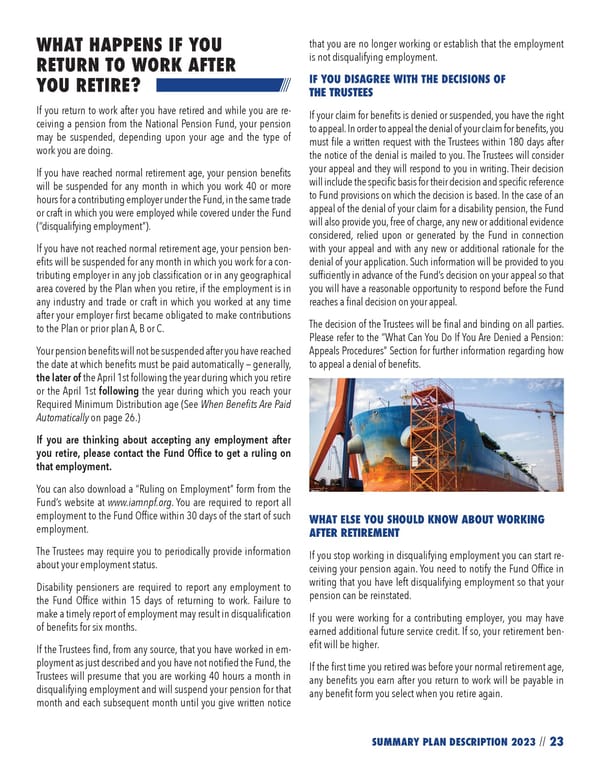23 SUMMARY PLAN DESCRIPTION 2023 // WHAT HAPPENS IF YOU RETURN TO WORK AFTER YOU RETIRE? If you return to work after you have retired and while you are re- ceiving a pension from the National Pension Fund, your pension may be suspended, depending upon your age and the type of work you are doing. If you have reached normal retirement age, your pension benefits will be suspended for any month in which you work 40 or more hours for a contributing employer under the Fund, in the same trade or craft in which you were employed while covered under the Fund (“disqualifying employment”). If you have not reached normal retirement age, your pension ben- efits will be suspended for any month in which you work for a con- tributing employer in any job classification or in any geographical area covered by the Plan when you retire, if the employment is in any industry and trade or craft in which you worked at any time after your employer first became obligated to make contributions to the Plan or prior plan A, B or C. Your pension benefits will not be suspended after you have reached the date at which benefits must be paid automatically — generally, the later of the April 1st following the year during which you retire or the April 1st following the year during which you reach your Required Minimum Distribution age (See When Benefits Are Paid Automatically on page 26.) If you are thinking about accepting any employment after you retire, please contact the Fund Office to get a ruling on that employment. You can also download a “Ruling on Employment” form from the Fund’s website at www.iamnpf.org. You are required to report all employment to the Fund Office within 30 days of the start of such employment. The Trustees may require you to periodically provide information about your employment status. Disability pensioners are required to report any employment to the Fund Office within 15 days of returning to work. Failure to make a timely report of employment may result in disqualification of benefits for six months. If the Trustees find, from any source, that you have worked in em- ployment as just described and you have not notified the Fund, the Trustees will presume that you are working 40 hours a month in disqualifying employment and will suspend your pension for that month and each subsequent month until you give written notice that you are no longer working or establish that the employment is not disqualifying employment. IF YOU DISAGREE WITH THE DECISIONS OF THE TRUSTEES If your claim for benefits is denied or suspended, you have the right to appeal. In order to appeal the denial of your claim for benefits, you must file a written request with the Trustees within 180 days after the notice of the denial is mailed to you. The Trustees will consider your appeal and they will respond to you in writing. Their decision will include the specific basis for their decision and specific reference to Fund provisions on which the decision is based. In the case of an appeal of the denial of your claim for a disability pension, the Fund will also provide you, free of charge, any new or additional evidence considered, relied upon or generated by the Fund in connection with your appeal and with any new or additional rationale for the denial of your application. Such information will be provided to you sufficiently in advance of the Fund’s decision on your appeal so that you will have a reasonable opportunity to respond before the Fund reaches a final decision on your appeal. The decision of the Trustees will be final and binding on all parties. Please refer to the “What Can You Do If You Are Denied a Pension: Appeals Procedures” Section for further information regarding how to appeal a denial of benefits. WHAT ELSE YOU SHOULD KNOW ABOUT WORKING AFTER RETIREMENT If you stop working in disqualifying employment you can start re- ceiving your pension again. You need to notify the Fund Office in writing that you have left disqualifying employment so that your pension can be reinstated. If you were working for a contributing employer, you may have earned additional future service credit. If so, your retirement ben- efit will be higher. If the first time you retired was before your normal retirement age, any benefits you earn after you return to work will be payable in any benefit form you select when you retire again.
 2023 NPF Summary Plan Description Page 24 Page 26
2023 NPF Summary Plan Description Page 24 Page 26